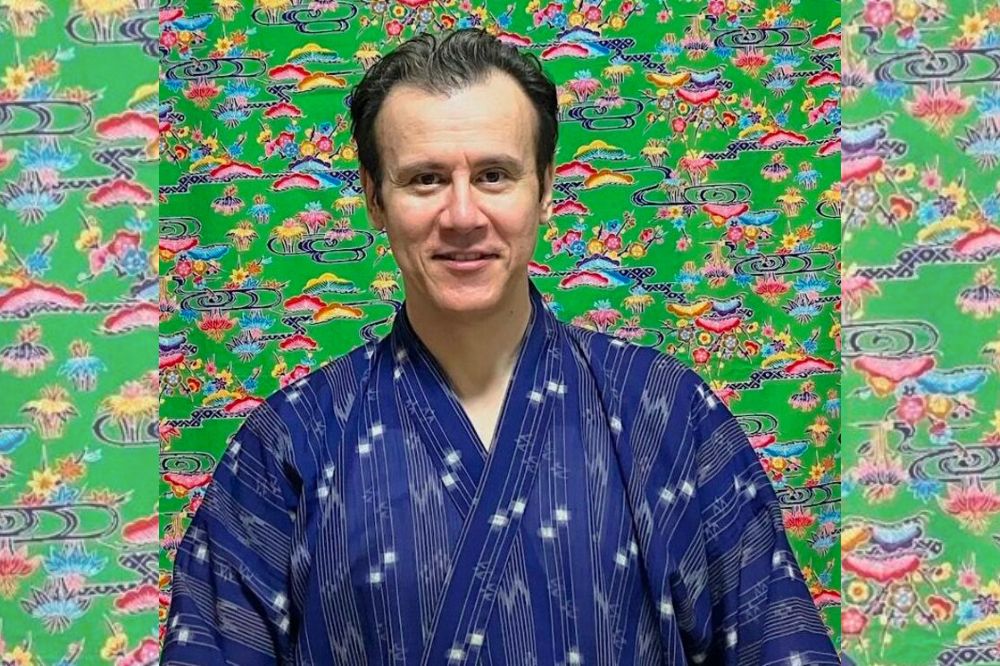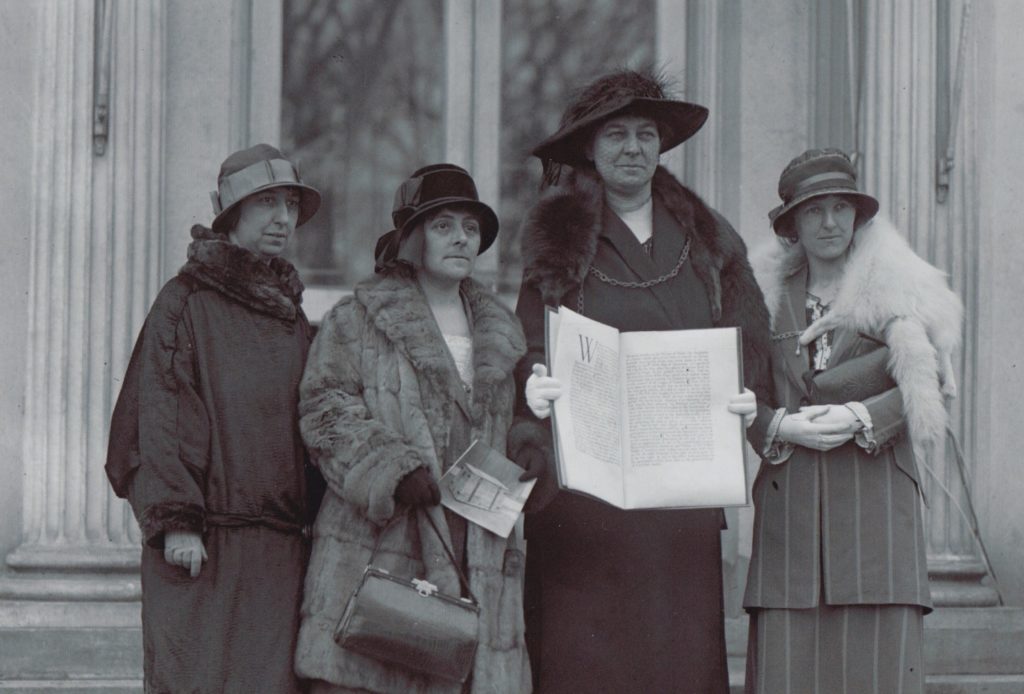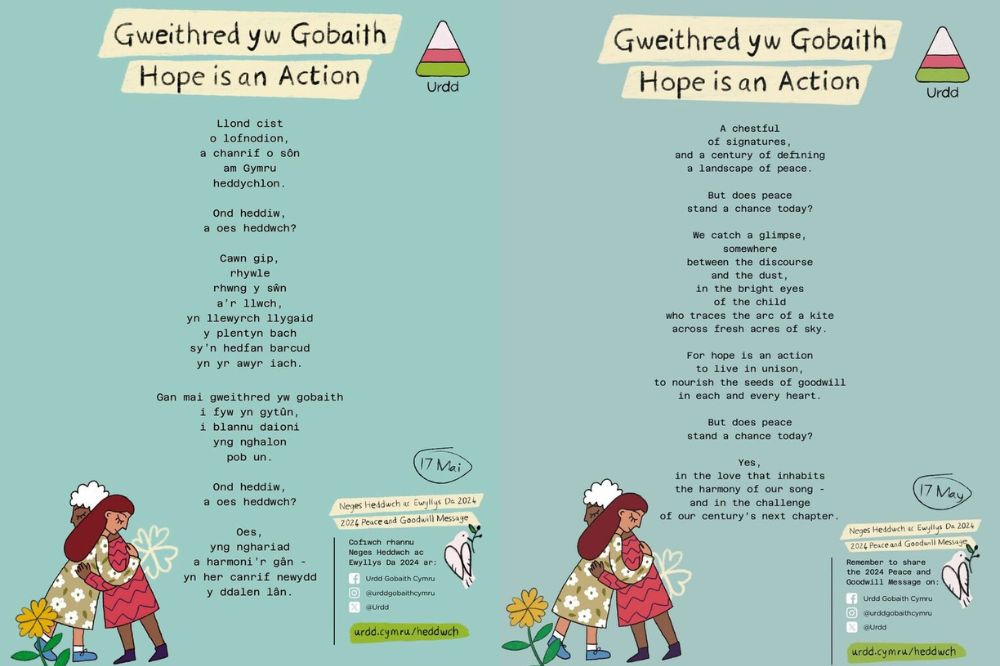 Translator Fija Byron
Translator Fija Byron
Stephen Price
In a bid to strengthen Wales’ connections with Japan, a writer based in Japan has shared a special translation of the Urdd’s peace message in one of the country’s endangered minority languages.
For the past 15 years, Jon Mitchell has been writing about the islands of Okinawa, which share many similarities with Wales, most notably attempts to revive endangered languages.
Last year, he arranged for the annual Urdd Peace and Good Will message to be translated into the Okinawan language for the first time, and from this year onwards, the newspaper, Okinawa Times, will translate and publish the Urdd message annually.
Jon’s hope is that this will help to build awareness and solidarity between our two countries.
Since 1922, young people from Wales have shared an annual Peace and Goodwill Message around the world – and this year, for the first time, there is an Uchinaaguchi version.
Translated by linguist, Fija Byron, it joins more than 65 other languages to be spread online by message organisers, Urdd Gobaith Cymru, the largest youth association in Wales.

Tradition
The unique tradition – the only one in the world – began in the aftermath of World War One, with a message that expressed the wish, “there will be no need for any of us, as we grow older, to show our pride for the country in which we were born by going out to hate and to kill one another.”
Since then, each year, young Welsh people have written a message, transmitting it via Morse code, telegram, radio, and today, the Internet. Past themes have included nuclear disarmament, poverty reduction and how to halt global warming.
 The delegation of Welsh women who took the historic peace petition to the United States of America in 1924 was led by Annie Hughes-Griffiths who is pictured holding the appeal on the steps of the White House in Washington DC with (L-R) Gladys Thomas, Mary Ellis and Elined Prys. Photo credit: Welsh Centre for International Affairs.
The delegation of Welsh women who took the historic peace petition to the United States of America in 1924 was led by Annie Hughes-Griffiths who is pictured holding the appeal on the steps of the White House in Washington DC with (L-R) Gladys Thomas, Mary Ellis and Elined Prys. Photo credit: Welsh Centre for International Affairs.
In recent years, the annual messages have been translated and shared with more than 80 million people; to celebrate the Peace Message’s centenary, in 2022, it was transmitted from the Nobel Peace Centre, Norway.
Uchinaaguchi is one of the languages of the Ryukyu islands. After the Japanese government seized the Ryukyu Kingdom in 1879, the number of its speakers declined.
Some schools disciplined pupils who used their local languages by compelling them to wear a hogen fuda punishment plaque – a system akin to the one in Wales whereby speakers were forced to wear a “Welsh Not.”
Today, UNESCO categorizes Uchinaaguchi and the other Ryukyuan languages as threatened with extinction.
Fija Byron, the translator of this year’s peace message, is one of the linguists leading the movement to revive use of Uchinaaguchi.
The 2024 Peace and Goodwill Message took the form of a poem, commemorating the women’s peace petition in Wales which, between 1923 and 1924, gathered the signatures of 390,000 Welsh women, approximately three quarters of the female population at the time.
Women delivered the chest containing the petition to female peace activists in the United States to encourage them to cooperate in eliminating future wars.
The 2024 message was written in Welsh by singer and poet Casi Wyn, students from Cardiff and Vale College, and Urdd members.
Commenting on the addition of Uchinaaguchi to the message translations, Chief Executive of Urdd Gobaith Cymru, Siân Lewis, told Okinawa Times: “As Wales’ largest youth organisation, we have ambitious plans to ensure Wales and the Welsh language makes a positive impact in the world.
“We are thankful to those that have helped share our Message of Goodwill far and wide, including our new friends and supporters in Okinawa, who have translated this year’s Message to Uchinaaguchi for the very first time.
“Today, across many platforms and in over 65 languages, the voices of our young people have been heard.”

Welsh connections
Speaking from his home in Japan, Jon Mitchell told Nation.Cymru: “I’ve been writing about Okinawa since 2009. During that time, I’ve mainly focused on the environmental damage of US military operations and the Okinawan peace movement (which is one of the most inspirational and most resilient in the world).
“In 2023, I had just won a string of awards for my journalism and books; I was approaching my 50th birthday so I took some time to reflect on my own upbringing in Wales and how it had impacted my writing.
“Around that time, I came across the Urdd Peace and Goodwill message and I thought it was a wonderful tradition that ought to be shared even more widely around the world. There had been no translation of the message into the Okinawan languages so I saw this as a way to initiate understanding between Okinawan and Welsh people about the similarities we share.
“My newspaper, Okinawa Times, was very supportive and we published the 2024 message on our front-page last year.”
 The Urdd’s Peace Message from 2024
The Urdd’s Peace Message from 2024
The translator for last year’s message (and this year’s) is Fija Byron Sensei who is on the front lines of the movement to revitalise the Okinawan languages.
Astonishingly, there are six families of Ryukyuan languages all of which are mutually incomprehensible and incomprehensible from the Japanese language, and Fija Sensei is an outspoken advocate for the revival of these languages, holding workshops and writing widely.
According to Jon, their revival is an uphill struggle. He shared: “The Japanese government does not help to promote these languages and seems content to allow them to vanish.
“This is just one sign of how mainland Japan discriminates against Okinawa, dating back to the mid-19th century when Japan annexed the islands.”
He isn’t without hope though, adding: “Both Wales and Okinawa have a strong tradition of peace building, a strong tradition of the creative arts, and a strong pride in our unique cultures. But people in Wales don’t know about Okinawa nor do people in Okinawa know about Wales.
“So, in the coming years I aspire to build understanding between these two places that mean the most to me in the world. I am hopeful that advocates of the Okinawan languages (including Fija Sensei) can visit Wales to learn firsthand about the successes (and failures) of the revival of the Welsh language.
“At the same time, I would love people from Wales to visit Okinawa where they can understand better about the discrimination that Okinawans still face; such awareness can hopefully put pressure on the government of Japan (and the United States which possesses 31 bases in tiny Okinawa) to improve the conditions that Okinawans face.
“I believe that Wales can help to raise awareness and push for change outside its borders.”
The message, translations and accompanying videos can be viewed on the Urdd homepage at https://www.urdd.cymru/en/peace-and-goodwill
Support our Nation today
For the price of a cup of coffee a month you can help us create an
independent, not-for-profit, national news service for the people of Wales, by
the people of Wales.

AloJapan.com